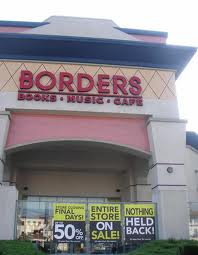 Creditors were unimpressed with the restructuring plan Borders presented to them yesterday. The New York Times reported that Borders "promised publishers and landlords a sleeker, more efficient company poised to emerge successfully from bankruptcy through increased online sales and revamped stores. But publishers characterized the plan as unrealistic and said they were more convinced than ever that Borders would be forced to sell itself or liquidate."
Creditors were unimpressed with the restructuring plan Borders presented to them yesterday. The New York Times reported that Borders "promised publishers and landlords a sleeker, more efficient company poised to emerge successfully from bankruptcy through increased online sales and revamped stores. But publishers characterized the plan as unrealistic and said they were more convinced than ever that Borders would be forced to sell itself or liquidate."
In a "lengthy meeting" with creditors, including Penguin Group USA, Random House, HarperCollins and the Perseus Books Group, Borders executives said the company "could make a profit by the end of this year and that by 2015 it hoped to make nearly 40% of its revenue from online sales, including e-books and print books sold on its website."
"We are not impressed," one publisher said. "None of it gave us any reason to think they can get themselves out of this. I don’t think it’s changed anybody’s mind."
Borders spokeswoman Mary Davis called the discussion "productive," and told the creditors "that the business plan we are proposing represents the best path forward for a vibrant and profitable Borders that is in the best interest of our creditors, employees, publishers, consumers and other stakeholders."
---
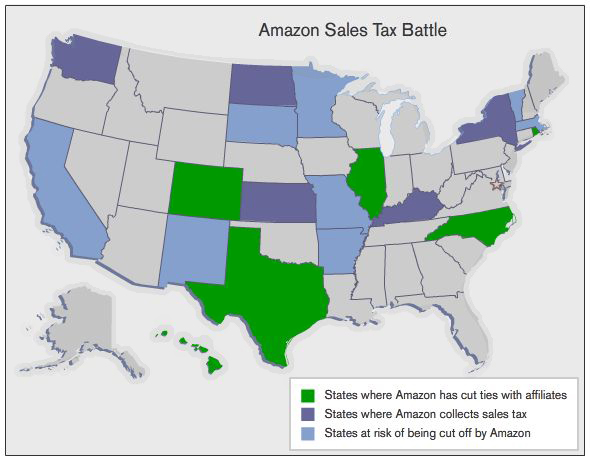 Last Friday, Arkansas Governor Mike Beebe signed Senate Bill 738, which "imposes sales tax-collection responsibilities on Internet retailers that are referred visitors by affiliate web sites based in Arkansas and generate more than $10,000 a year in sales from Arkansas residents," InternetRetailer.com reported. "We have a lot of local businesses in Arkansas, both small and large
companies, that collect sales tax and we're trying to level the playing
field," a spokesman for the governor said.
Last Friday, Arkansas Governor Mike Beebe signed Senate Bill 738, which "imposes sales tax-collection responsibilities on Internet retailers that are referred visitors by affiliate web sites based in Arkansas and generate more than $10,000 a year in sales from Arkansas residents," InternetRetailer.com reported. "We have a lot of local businesses in Arkansas, both small and large
companies, that collect sales tax and we're trying to level the playing
field," a spokesman for the governor said.
MobyLives pointed out that Beebe "said the thing that most state governors are bending over backwards trying NOT to say," yet InternetRetailer.com was the only media outlet that "reported the signing--even the state's leading newspaper, the Arkansas Times, has no coverage of the signing on its website."
InternetRetailer.com noted that Arkansas "has been working with the multi-state Streamlined Sales Tax Project toward a federal law that would require all retailers to collect sales tax, but that effort is not expected to succeed any time soon and Beebe sees the Amazon tax law as a way to bring about more immediate way of increasing collection of sales tax revenue..."
---
It's e-readers vs. p-readers in "the changing landscape of book clubs, those ubiquitous living-room forums where dog-eared tomes--with favorite passages marked by hand--often now share space with Kindles, Nooks, iPads, iPhones and other portable devices. Resentments simmer. Protocols are upended," the Oroville, Calif. Mercury-Register wrote.
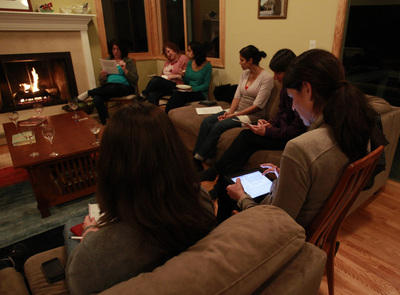
Santa Cruz book club member Mary Offermann used the word "disgust" to describe her feelings about e-books, adding that, as an artist, she treasures "the heft, the feel, the visual pleasure of a well-designed book.... Well, disgust might be too strong a word, but it is close." She also expressed surprise at the "avidity with which, when we're ready to discuss what book to read at our next meeting, my friends jump to their Kindles. It's as though the other people aren't even in the room."
Lauren Angelo is an e-convert, reading "an e-book on her iPhone while standing in line at the grocery store. Waiting for a friend at the gym, she reads it some more.... And unlike some of her friends, tethered to less tote-able 'physical books,' Angelo will finish on time. 'Reading on all my devices,' book club deadlines are never a problem, says Angelo, who even rocks her 6-month-old to sleep with a Kindle in hand," the Mercury-Register noted
Nancy Salmon, a book club liaison on staff at Kepler's Books, Menlo Park, said she has not noticed much e-book infiltration yet among the 254 clubs registered at the store.
---
Tom Ahern, owner of Latitude 33 Bookshop, Laguna Beach, Calif., has put his business up for sale, attributing the decision to his wife's health issues, the Coastline Pilot reported.
"I'm hoping that someone or group of individuals will feel strongly enough that we need a good bookstore in Laguna Beach and say, 'Yes, let's buy them out,' " he said, citing the recent sale of Politics and Prose as an example of his best-case scenario.
"I have to take care of my wife. I can't do that and manage the bookstore," he added. "It's time for me to re-pot myself."
---
 Independent booksellers in Singapore are also responding to the industry reverberations sparked by financial troubles for Borders and REDgroup Retail. SGEntrepreneurs.com profiled indie bookstore BooksActually, "a beacon for those who worry that the bounded word will fade into obscurity, and with it the sweet smell of promise that comes with each new book."
Independent booksellers in Singapore are also responding to the industry reverberations sparked by financial troubles for Borders and REDgroup Retail. SGEntrepreneurs.com profiled indie bookstore BooksActually, "a beacon for those who worry that the bounded word will fade into obscurity, and with it the sweet smell of promise that comes with each new book."
For owners Karen Wai and Kenny Leck, "running an independent bookstore, serving the needs of their customers and building the BooksActually brand hasn't been easy sailing.... Throughout the years, and across the various spaces, Karen and Kenny have built and brought together a community of fans and lovers of literature around their store. They do it by being community leaders, organizing book launches and readings," SGEntrepreneurs.com wrote, then asked: "So why should you visit BooksActually when stores like Amazon and Kinokuniya have such an amazingly large catalogue?"
Leck replied that "recommending a book is more than looking at past and related purchases of other customers. There are many lens of perspective through which an individual can read a piece of work and depending on the person and the lens used (or preferred), lines between related works can be drawn and connections, that an algorithm won’t be able to discover, made. More importantly, if you place your trust in the curator, then it is possible for them to introduce you to new perspectives through the reading of a seemingly unrelated piece of work that will inform the original book bought and read."
---
 "We have a saying: Cairo writes. Beirut prints. Baghdad reads," Abdul-Wahab Mizher al-Radi, proprietor of the House of Scientific Books on Baghdad's Mutanabi Street, told Reuters, which reported that four years after a car bomb killed 26 people and demolished the booksellers' market here "the street is again open, guarded and seemingly safe, and jammed every Friday with students, professors and professionals."
"We have a saying: Cairo writes. Beirut prints. Baghdad reads," Abdul-Wahab Mizher al-Radi, proprietor of the House of Scientific Books on Baghdad's Mutanabi Street, told Reuters, which reported that four years after a car bomb killed 26 people and demolished the booksellers' market here "the street is again open, guarded and seemingly safe, and jammed every Friday with students, professors and professionals."
"Mutanabi Street is the cultural catharsis point for Iraqis," said al-Radi. "Mutanabi is a place where intellectuals of Iraq come, not just to buy books but to see the new place, to see the statue of Mutanabi, to meet friends on a Friday.... There has been a jump forward in demand for buying books, from students, intellectuals, the youth. Young people are looking for youthful books. Intellectuals are buying cultural books. Professionals and students are buying reference books."
---
 Cool idea of the day that also happens to be a reminder spring has finally arrived: In its e-newsletter, Antigone Books, Tucson, Ariz., offered customers some incentive to participate in the city's Bike to Work Week: "Ride your bike to the store, show us your helmet, and you can have a free bike sticker. (And we have lots of fun stickers to choose from!) Many other businesses (including lots on 4th Avenue) are also offering discounts, freebies, bike tune-ups and more.... Happy bicycling!"
Cool idea of the day that also happens to be a reminder spring has finally arrived: In its e-newsletter, Antigone Books, Tucson, Ariz., offered customers some incentive to participate in the city's Bike to Work Week: "Ride your bike to the store, show us your helmet, and you can have a free bike sticker. (And we have lots of fun stickers to choose from!) Many other businesses (including lots on 4th Avenue) are also offering discounts, freebies, bike tune-ups and more.... Happy bicycling!"
---
For the Georgetown Dish, Leslie Maysak told some "tales of bookstores past" in Washington, D.C., while observing, "Few cities in the world offer the 'Common Reader' such a rich array of literary fare and even as more of the book business is conducted online (and on Kindles and iPhones), I'll never tire of reading a new book on a bench under a tree."
---
Greenlight Bookstore, Brooklyn, N.Y., was the featured location for LXTV NBC's Ben Aaron to interview Arielle Eckstut and David Henry Sterry (The Essential Guide to Getting Your Book Published: How to Write It, Sell It and Market It... Successfully!)--as well as some of their "pitchers"--at a recent Pitchapalooza event.
---
Do blurbs and covers sell books? The Awl asked six authors to weigh in on this eternal question for the book trade.
"I honestly have no idea how important blurbs are for the general reading public," said Kate Christensen. "Knowing what I know, whenever I see a blurb, I immediately assume the writer is friends with that person or has studied with them or babysat their kids—or slept with them or is blackmailing them or has a gun to their head. In other words, I give blurbs no credence whatsoever."
Stefanie Pintoff observed that "three aspects of a book make the greatest first impression on potential readers. The opening sentence. The title. And, of course, the cover. If the cover art does its job well, it will portray the tone and genre of the book accurately--and help it stand out from its competition on the bookshelf."
---
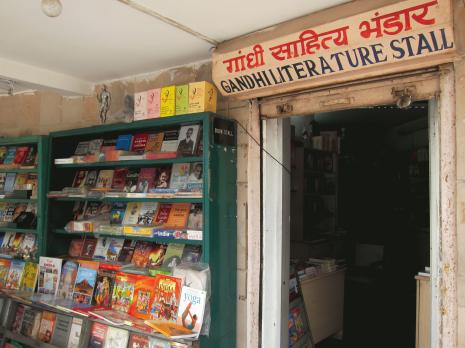 Meredith Blake shared "bookspotting" slides from her recent trip to India on the New Yorker's Book Bench blog. "One thing, in particular, was both a surprise and a delight: for those of us who love the written word--especially the kind printed on dead trees--India is a treasure trove," she wrote. "In Delhi alone, there's close to a dozen English-language newspapers, many of which sell for a a few rupees a piece, and English-language bookstores are well-stocked with cheap Penguin classics. Best of all, used-book markets abound, where yards of frayed paperbacks and magazines provide dangerous temptation for packrats like me."
Meredith Blake shared "bookspotting" slides from her recent trip to India on the New Yorker's Book Bench blog. "One thing, in particular, was both a surprise and a delight: for those of us who love the written word--especially the kind printed on dead trees--India is a treasure trove," she wrote. "In Delhi alone, there's close to a dozen English-language newspapers, many of which sell for a a few rupees a piece, and English-language bookstores are well-stocked with cheap Penguin classics. Best of all, used-book markets abound, where yards of frayed paperbacks and magazines provide dangerous temptation for packrats like me."
---
Presenting writers and their dogs, courtesy of photographer Jill Krementz and New York Social Diary.
---
Book trailer of the day: Skinny by Diana
Spechler (Harper Perennial).
---
Effective April 29, Rob Dyer is leaving Wiley,
where he is director of independent trade sales. He has been at Wiley since
1991 and may be reached at contactdyer@gmail.com.
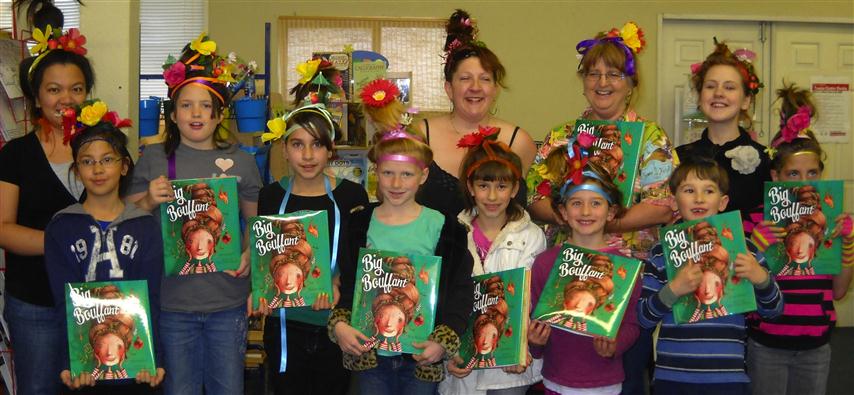










 Creditors were unimpressed with the restructuring plan Borders presented to them yesterday. The
Creditors were unimpressed with the restructuring plan Borders presented to them yesterday. The 
 Independent booksellers in Singapore are also responding to the industry reverberations sparked by financial troubles for Borders and REDgroup Retail.
Independent booksellers in Singapore are also responding to the industry reverberations sparked by financial troubles for Borders and REDgroup Retail.  "We have a saying: Cairo writes. Beirut prints. Baghdad reads," Abdul-Wahab Mizher al-Radi, proprietor of the House of Scientific Books on Baghdad's Mutanabi Street, told
"We have a saying: Cairo writes. Beirut prints. Baghdad reads," Abdul-Wahab Mizher al-Radi, proprietor of the House of Scientific Books on Baghdad's Mutanabi Street, told  Cool idea of the day that also happens to be a reminder spring has finally arrived: In its e-newsletter,
Cool idea of the day that also happens to be a reminder spring has finally arrived: In its e-newsletter,  Meredith Blake shared "bookspotting" slides from her recent trip to India on the New Yorker's
Meredith Blake shared "bookspotting" slides from her recent trip to India on the New Yorker's 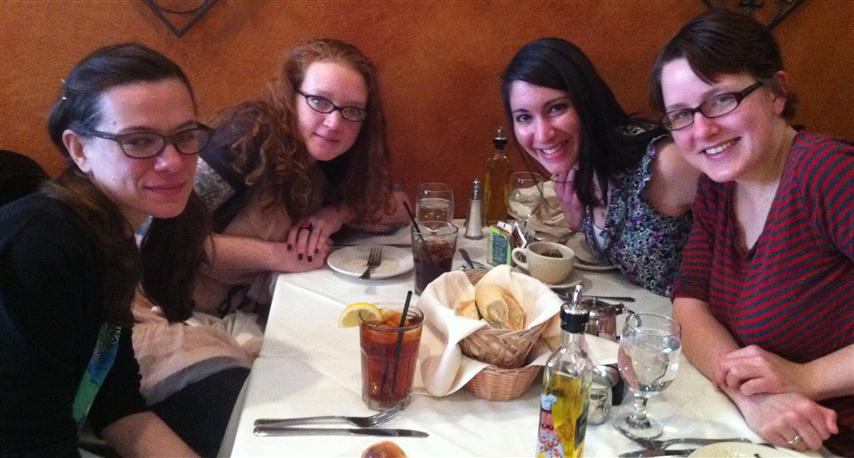
 In the book, journalist Daniel Mandelkern leaves Hamburg to interview Dirk Svensson, a reclusive children's book author who lives alone on the Italian side of Lake Lugano with his three-legged dog. Mandelkern has been quarreling with his wife (who is also his editor); he suspects she has other reasons for sending him away. After stumbling on a manuscript of Svensson's about a complicated ménage à trois, Mandelkern is plunged into mysteries past and present. GBO commented: "Rich with anthropological and literary allusion, this prize-winning debut set in Europe, Brazil, and New York, tells the parallel stories of two writers struggling with the burden of the past and the uncertainties of the future."
In the book, journalist Daniel Mandelkern leaves Hamburg to interview Dirk Svensson, a reclusive children's book author who lives alone on the Italian side of Lake Lugano with his three-legged dog. Mandelkern has been quarreling with his wife (who is also his editor); he suspects she has other reasons for sending him away. After stumbling on a manuscript of Svensson's about a complicated ménage à trois, Mandelkern is plunged into mysteries past and present. GBO commented: "Rich with anthropological and literary allusion, this prize-winning debut set in Europe, Brazil, and New York, tells the parallel stories of two writers struggling with the burden of the past and the uncertainties of the future." Emily Wilson is a beautiful New Yorker, matched with a gorgeous husband and with a bestselling novel to her credit--until her world changes in an instant. After 10 years of marriage, husband Joel decides to leave her for another woman, and they are divorcing. Emily has had persistent writer's block, now she must add to that problem a vision of herself as a woman scorned. Her best friend, Annabelle, suggests a change of scene, so Emily agrees to go see her Aunt Bee on Bainbridge Island in Washington State, a place where she spent many happy summers. The instant she arrives, she realizes she has been gone too long: the scent of seawater, the mountain vista, the endless beach--all call to her in a way that calms her and begins to put everything in perspective.
Emily Wilson is a beautiful New Yorker, matched with a gorgeous husband and with a bestselling novel to her credit--until her world changes in an instant. After 10 years of marriage, husband Joel decides to leave her for another woman, and they are divorcing. Emily has had persistent writer's block, now she must add to that problem a vision of herself as a woman scorned. Her best friend, Annabelle, suggests a change of scene, so Emily agrees to go see her Aunt Bee on Bainbridge Island in Washington State, a place where she spent many happy summers. The instant she arrives, she realizes she has been gone too long: the scent of seawater, the mountain vista, the endless beach--all call to her in a way that calms her and begins to put everything in perspective.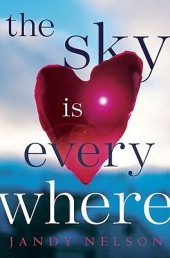 The winner of NCIBA's Book of the Year award in the teen lit category is The Sky Is Everywhere by Jandy Nelson (Dial), not The Sky Is Forever, which was in the material sent to us. We apologize for any confusion.
The winner of NCIBA's Book of the Year award in the teen lit category is The Sky Is Everywhere by Jandy Nelson (Dial), not The Sky Is Forever, which was in the material sent to us. We apologize for any confusion.